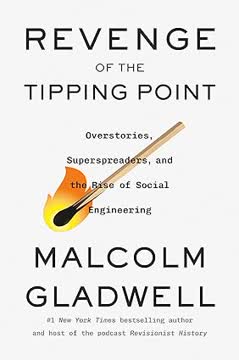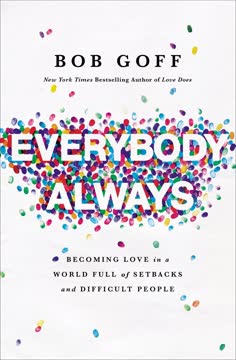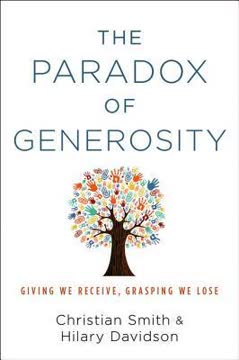Key Takeaways
1. The Paradox: Giving Freely Leads to Receiving More
Giving We Receive, Grasping We Lose
A fundamental truth. Generosity operates on a counterintuitive principle: by expending resources for others, we paradoxically enhance our own lives. This isn't merely a philosophical or religious tenet, but a sociological fact, consistently observed across diverse human experiences. Conversely, clinging tightly to what we possess often diminishes its long-term value and leaves us feeling more anxious and vulnerable.
Ancient wisdom echoes. This paradox is not new; it's a recurring theme in ancient wisdom traditions worldwide. From Hebrew proverbs ("One man gives freely, yet gains even more; another withholds unduly, but ends up impoverished") to Buddhist teachings ("Giving brings happiness at every stage of its expression") and the words of Jesus ("Whoever tries to keep his life will lose it, and whoever loses his life will preserve it"), the message is consistent. These timeless insights are now corroborated by modern social-scientific research.
Beyond zero-sum. Generosity defies simple cost-benefit analysis, revealing a "win-win" dynamic. Instead of a net loss, givers often receive back goods far more valuable than what they gave, such as happiness, health, and a profound sense of purpose. This transformative power suggests that true flourishing comes not from accumulation, but from the free and abundant giving of oneself.
2. Generosity Enhances Happiness, Health, and Purpose
The more generous Americans are, the more happiness, health, and purpose in life they enjoy.
Empirical evidence. Extensive national surveys confirm a strong and consistent association between generous practices and enhanced personal well-being. This link holds true across various forms of giving and multiple measures of life satisfaction, indicating that generosity is a significant factor in a flourishing life. The data show that generous individuals are notably happier, healthier, and possess a clearer sense of direction.
Multifaceted benefits. The positive outcomes of generosity extend beyond just feeling good. They encompass:
- Happiness: Generous financial givers and volunteers report higher levels of happiness.
- Bodily Health: Generosity is linked to better physical health and fewer chronic illnesses.
- Purpose in Living: Givers experience a stronger sense of meaning and direction in their lives.
- Avoidance of Depression: Generous individuals are less prone to depressive symptoms.
- Personal Growth: They show a greater interest in self-improvement and development.
A clear pattern. Across nine different measures of generosity—including financial giving, volunteering, relational care, and neighborly acts—the pattern remains consistent: greater generosity correlates with greater well-being. This robust association suggests that generosity is not just a byproduct of a good life, but an active contributor to it.
3. Sustained Practices, Not Single Acts, Drive Well-being
Regular practices of generosity that are repeated over time and involve some amount of ongoing intention and attention have the capacity to form people in ways that increase their happiness in life.
The power of repetition. The impact of generosity on well-being is not derived from isolated, one-time acts, but from sustained, intentional practices. Activities like regular financial giving, consistent volunteering, or ongoing relational care deeply shape an individual's character and outlook over time. These repeated behaviors foster a transformative process that leads to lasting improvements in happiness, health, and purpose.
Distinguishing acts from practices. The research highlights a crucial distinction:
- Generous Practices: These are recurrent, meaningful activities requiring consistent intention and attention (e.g., tithing, weekly volunteering, regularly helping neighbors). They are strongly linked to increased well-being.
- One-Time Events: These are sporadic or singular decisions (e.g., becoming an organ donor, writing a will, lending a possession, infrequent blood donation). While valuable, they show no significant association with enhanced well-being for the giver, as they lack the sustained engagement needed for personal formation.
Shaping identity. Practices of generosity become integral to a person's identity, influencing their self-perception and their engagement with the world. This ongoing commitment, rather than a fleeting gesture, is what cultivates the internal shifts necessary for greater well-being. It's the continuous effort and meaning embedded in these practices that truly make a difference.
4. Generosity Triggers Positive Brain and Body Chemistry
Generosity often triggers chemical systems in the brain and body that increase pleasure and experiences of reward, reduce stress, and suppress pain, which tend to lead to greater happiness and health.
The "helper's high." Acting generously isn't just emotionally rewarding; it has a profound neurobiological basis. Generous behaviors stimulate the release of beneficial chemicals in the brain and body, such as oxytocin, dopamine, serotonin, and endorphins. These neurochemicals are associated with feelings of pleasure, social bonding, reduced stress, and even pain suppression, contributing directly to increased happiness and improved physical health.
A virtuous cycle. This biochemical response creates a "warm glow" effect, reinforcing generous behavior. Studies using fMRI technology show that the brain's reward centers "light up" when people give, similar to when they receive tangible rewards. This suggests that our bodies are naturally wired to find generosity pleasurable, creating a positive feedback loop where giving leads to good feelings, which in turn encourages more giving.
Stress reduction. Conversely, a lack of generosity can trigger negative biochemical responses. Research indicates that stingy behavior can lead to increased cortisol levels, the stress hormone, possibly due to feelings of guilt or embarrassment. This highlights how generosity, by fostering positive emotions and reducing stress, acts as a protective mechanism for both mental and physical well-being, boosting immunity and overall health.
5. An Abundance Mindset Fuels Generosity and Well-being
Practicing generosity requires and reinforces the perception of living in a world of abundance and blessing, which itself also increases happiness and health.
Perception shapes reality. Our subjective perception of whether we live in a world of scarcity or abundance profoundly impacts our well-being. People with the same objective resources can feel either secure and grateful or anxious and deprived. Generosity challenges individuals to confront and often overcome fears of insufficiency, shifting their outlook from one of scarcity to one of blessing and overflow.
Liberating transformation. This paradigm shift from scarcity to abundance is liberating. It reduces anxiety, worry, and dissatisfaction, which are detrimental to health and happiness. When people believe they have enough, they are freed to appreciate what they possess, enjoy life more fully, and are more inclined to share. This mental and emotional transformation fosters a sense of security that is not dependent on material accumulation.
Beyond material wealth. The "poverty of anxiety" can afflict even the wealthy, who constantly fear losing what they have or not having enough. Generosity helps break this cycle by redirecting focus from self-protection and hoarding to sharing and connection. This reorientation cultivates gratitude and contentment, promoting a healthier and happier existence, regardless of one's objective financial status.
6. Generosity Builds Stronger Social Connections and Identity
Generosity expands the number and density of social-network relational ties, which tends strongly to lead to greater happiness and health.
Networking for well-being. Generous practices inherently involve reaching out and strengthening social bonds. Volunteering, relational care, and even financial giving often embed individuals within new communities and relationships. These expanded social networks provide crucial benefits:
- Access to information and resources: A wider circle of contacts offers diverse knowledge and support.
- Emotional support: Strong social ties act as a buffer against life's difficulties.
- Opportunities for engagement: More connections lead to more invitations and requests for participation.
Meaningful roles. Generosity also helps individuals forge positive and meaningful social roles and self-identities. A volunteer becomes "a helper at the shelter," a donor "a supporter of the arts." These roles provide a sense of purpose and belonging, affirming one's value and contribution to the world. This self-perception of being a "good person" or "community builder" significantly enhances mental and emotional well-being.
Stronger relationships. Within existing relationships, generosity fosters deeper connections. Generous individuals tend to be more compassionate, forgiving, and empathetic, qualities that strengthen bonds with spouses, family, and friends. This mutual care and support create a robust relational fabric that contributes significantly to overall happiness and resilience.
7. Many Americans Are Ungenerous, Missing Out on Benefits
Very large numbers of Americans, despite (we presume) wanting to enjoy happy, healthy, purposeful lives, fail to practice the kinds of generosity that actually tend to lead to happiness, health, and purpose in life.
A second paradox. Despite the clear benefits of generosity, a significant portion of Americans do not regularly engage in generous practices. This creates a "second paradox": people desire well-being but often neglect the very behaviors that lead to it. This widespread ungenerosity means many are inadvertently forfeiting opportunities for greater happiness, health, and purpose.
Statistical realities:
- Financial Giving: Only 2.7% of Americans give 10% or more of their income. A staggering 44.8% give nothing at all, and 86.2% give less than 2%. The top 5% of givers contribute 57% of all charitable donations, highlighting a concentrated effort.
- Volunteering: Approximately 75% of Americans do not volunteer in any given year, with many citing a simple lack of interest.
- Other Forms: Participation in blood donation (11.5%), organ donation (43%), and estate giving (4.6%) also indicates significant room for increased generosity.
Reluctance to give. Many Americans express a theoretical willingness to be generous but fall short in practice. For instance, 67% are reluctant to give money to issues of concern, and 63% are hesitant to volunteer. This gap between intention and action suggests underlying barriers, often rooted in cultural messages of scarcity and self-interest.
8. Ungenerous Lives Are Often Marked by Anxiety and Apathy
The absence of generous practices has the capacity to shape people negatively, just as much as the presence of generosity affects them positively.
A cycle of discontent. Ungenerous Americans often find themselves trapped in a cycle of anxiety, self-absorption, and unfulfillment. Their lives are frequently characterized by:
- Fear of Scarcity: A constant worry about not having enough, even when objectively well-off, leading to hoarding and reluctance to share.
- Materialistic Pursuit: Happiness is often equated with acquiring more possessions, leading to an endless, unsatisfying quest for "the next big thing."
- Social Isolation: Limited engagement with others results in fewer meaningful friendships and a pervasive sense of loneliness.
Emotional toll. This mindset takes a significant emotional and physical toll. Ungenerous individuals report higher levels of stress, depression, and anxiety. They often feel overwhelmed by life's demands, leading to apathy towards personal growth and a diminished sense of purpose. The focus on self-preservation, while seemingly rational, paradoxically undermines their own well-being.
Justifying inaction. Many ungenerous individuals rationalize their lack of giving by emphasizing personal autonomy, believing they have no moral obligation to others beyond avoiding direct harm. Some even view generosity as a weakness or a misguided effort. This perspective, however, often leaves them feeling disconnected and cynical about society, further reinforcing their isolation and unhappiness.
9. Generous People Cultivate Resilience and Personal Growth
Generous people know the hard reality of what it means to be human—to make mistakes, to hurt and be hurt, to suffer.
Beyond perfection. Generous individuals are not immune to life's challenges; they face problems and setbacks just like anyone else. However, their approach to adversity differs significantly. Instead of succumbing to bitterness or self-pity, they cultivate resilience, gratitude, and a broader perspective. They understand that life is inherently messy but still worth living, beautiful, and meaningful.
Active self-improvement. Generous people actively pursue personal growth, often seeing it as an ongoing journey of self-expansion and character development. They are:
- Mindful of flaws: They acknowledge their shortcomings and actively work to improve them, whether in relationships or personal habits.
- Open to new experiences: They embrace learning and new activities, expanding their horizons and skills.
- Driven by purpose: Their growth is often tied to a desire to be better for others and to contribute positively to the world.
Transformative experiences. For some, generosity is intertwined with profound personal transformations, such as overcoming addiction or escaping abusive situations. The act of caring for others, even in the midst of personal struggle, can provide a powerful sense of efficacy and purpose, redirecting focus from self-absorption to constructive action. This outward orientation fosters inner strength and a deeper sense of contentment.
10. True Happiness Lies Beyond Material Acquisition
What they want most is the flourishing of people, their loved ones, the needy, the neglected, the environment, and so on.
Redefining "enough." Generous individuals often adopt a modest lifestyle, living within or below their means, not out of deprivation but out of a conscious choice. They recognize that endless material acquisition does not lead to lasting happiness. Instead, they find contentment in having "enough" and prioritize the well-being of others over accumulating more possessions.
Contentment vs. craving. Unlike ungenerous individuals who are perpetually chasing the next material comfort, generous people find satisfaction in their present circumstances. They are grateful for what they have—family, health, community—rather than constantly desiring what they lack. This shift in focus liberates them from the anxieties of consumerism and the endless pursuit of elusive material happiness.
A broader vision. For generous Americans, happiness is deeply intertwined with the flourishing of their communities and the world. Their purpose extends beyond personal gratification to include contributing to a greater good. This outward-looking perspective fosters a sense of solidarity and connection, leading to a richer, more profound sense of happiness that transcends individual circumstances.
11. Pathological Altruism Undermines Personal Well-being
When taken to extremes, generosity does not benefit the givers or even, in many cases, recipients.
The dark side of giving. While generosity is overwhelmingly positive, extreme, self-neglecting forms of giving, termed "pathological altruism," can be detrimental. This occurs when individuals prioritize others' needs to the point of severe self-harm, often driven by self-loathing, guilt, or a desperate need for validation. Such generosity does not lead to the well-being benefits observed in healthy giving.
Symptoms of pathology. Pathological altruists often exhibit:
- Self-neglect: Ignoring their own physical, mental, or financial needs.
- Self-loathing: Generosity stemming from a belief in their own unworthiness.
- Unhealthy motivations: Giving to be "abused" or to prove their selflessness, rather than genuine care.
- Negative outcomes: Despite extreme giving, they experience low happiness, poor health, and a lack of purpose.
Distinguishing healthy from unhealthy. The key difference lies in the underlying motivation and the impact on the giver's well-being. Healthy generosity is balanced, sustainable, and ultimately enriching for both giver and receiver. Pathological altruism, however, is often self-destructive, leading to a depletion of the giver's resources and spirit, and sometimes even harming the recipients through misguided or unsustainable aid. This rare but important exception highlights the need for moderation and self-awareness in the practice of generosity.
Last updated:
Review Summary
Readers found The Paradox of Generosity interesting but often repetitive. Many appreciated the research-based approach and compelling message about generosity's benefits. However, some felt the book was too long and academic for its content. Positive aspects included strong evidence and practical advice, while negatives centered on dry writing and overuse of statistics. Despite mixed opinions on execution, most readers agreed the core message was valuable, encouraging readers to consider how generosity can improve their lives and society.
Similar Books







Download PDF
Download EPUB
.epub digital book format is ideal for reading ebooks on phones, tablets, and e-readers.





